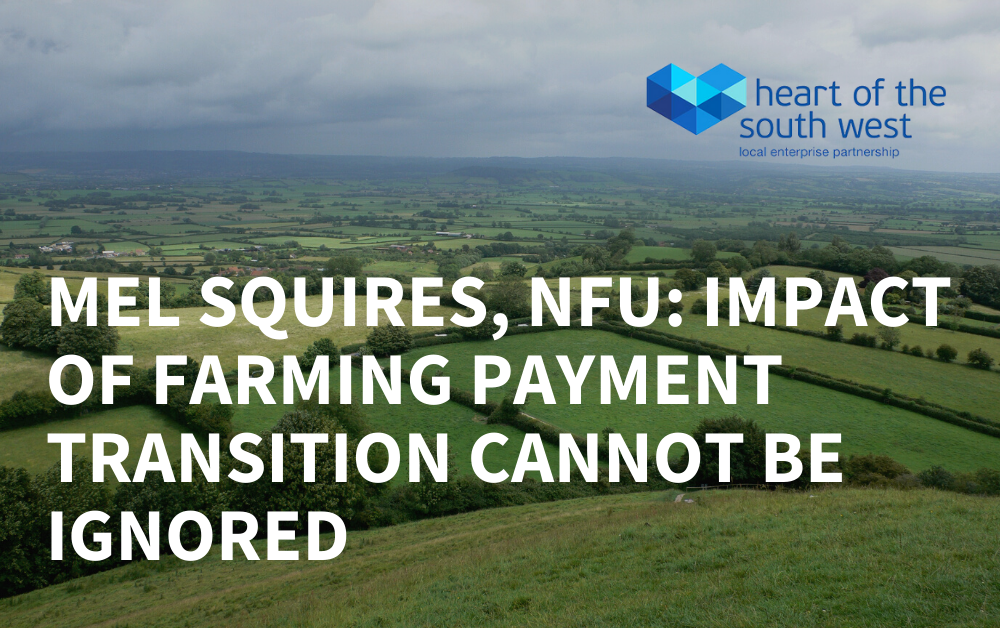Article written by Mel Squires, LEP board member and regional director at NFU South West, for the Western Morning News
Whether it’s the landscape cherished by those who live and work here, and the millions of people who love to come and see it every year, the farmed animals or fields of arable crops, the evidence of the profound impact our predominantly small and medium-sized family farms have had on the countryside is all around us.
Rather less visible are the enormous changes farming is currently undergoing. We are no longer part of the Common Agricultural Policy (CAP) and the Basic Payment Scheme (BPS) is being phased out between now and 2027.
BPS was the mechanism used to deliver farm support payments. Its aim was to ensure the sustained provision of food, protect against market volatility and other ‘shocks’, and underpin environmental gains. It is being replaced by payments for delivering various environmental goals.
The NFU has estimated that the average farm derives between a third and a half of its income from BPS, so this represents the biggest change to the financial structure of farming for a generation. The effects will ripple through to farm supply chains, communities, and the wider rural economy.
There are about 17,000 farm businesses in the Great South West area (Cornwall and the Isles of Scilly, Devon, Somerset and Dorset), most of them family-run SMEs, and each with financial links to many other local traders, from vets to machinery dealers to accountants.
Because of the close connection between farming and the wider rural economy, and the scale of the changes, the Great South West (GSW) partnership of LEPs (Local Economic Partnerships) and the NFU commissioned research to determine the impact the end of BPS would have. The research also looked into what could be done to support farms – and the businesses which rely on them – to cope and, just as importantly, respond to the needs of their businesses and market opportunities whilst delivering environmental benefits.
In terms of the impact, the results are sobering. The total BPS amount lost from the rural economy of the Great South West by the end of the transition period (2021 to 2027) will be £883.7 million.
As between a quarter and a half of BPS money is spent on businesses supporting the farming sector, there will also be a reduction of between £220m and £440m over the next five years for feed merchants, machinery retailers, contractors, vets and many other suppliers.
This will reduce their own spending power, and there will be a significant knock-on effect for jobs in the local economy.
Were this amount of money to be lost from a single location it would probably result in the introduction of special measures and funds to mitigate the impact. With BPS, the losses are being felt by thousands of businesses across the four counties of the GSW, and of course the entire region, with the danger that the impact – and response – will be diluted.
The tourism sector, which is worth £11 billion to the region annually, is vital to the GSW, and depends on farmers to provide well-managed and accessible landscapes and high-quality local food and drink.
Some of the income currently provided by BPS will be replaced by the new Sustainable Farming Initiative (SFI), but this has had an uncertain start in the region and the package of support is expected to be worth much less overall. It will also either not be accessible to all farmers, or as it currently stands, will not fit well with their practical business models.
Analysis by the Agriculture and Horticulture Development Board suggests that, at best, a farm might be able to replace two-thirds of its BPS income through the SFI, so even with the replacement scheme, there will still be a significant gap.
We are hearing from our members about how their family farming businesses and the wider rural economy are already battling significant (and rising) cost inflation. The scale of reductions in available funds to businesses laid bare by this report is considerable and can’t be ignored. The reality for many is that the availability of working capital, cashflow and maintaining the confidence to plan ahead and invest is becoming much more challenging.
Farming has a unique role to play in helping us reach net zero, but to achieve this and maintain and build on our high-quality local food supply chains we need strong, productive and well-invested farming businesses.
By highlighting this significant economic loss and the major changes to come, the aim is to help a wider range of people and organisations to think about how to mitigate the adverse impacts of BPS withdrawal, especially as the effects will be multiplied and felt right across areas like transport, employment, skills and rural connectivity.
The future of sustainable farming will be built upon a different model, which must be accessible and fair to all and work well, without imposing additional burdens on farmers.
That is why we are seeking the support of government and policy makers for a ‘whole farm’ approach to providing advice and assistance for farmers and rural businesses through this period of change.
This might be a positive approach to planning applications that drive business efficiency and meet environmental challenges or provide additional income through diversification; it could be about ensuring that capital investment incentives are attractive for all kinds of agricultural enterprises including family partnerships, not just limited companies.
Support could include research and development or helping farmers invest in new technology, finding ways to unlock labour availability on farms, or even just basic infrastructure investment such as making sure that farms and rural businesses have access to fast and reliable broadband.
This is a chance for government to offer innovative solutions that all farmers and growers can benefit from – and those benefits will be felt throughout the rural economy, communities and the environment they all support and rely on.
Read the findings from the report here.


